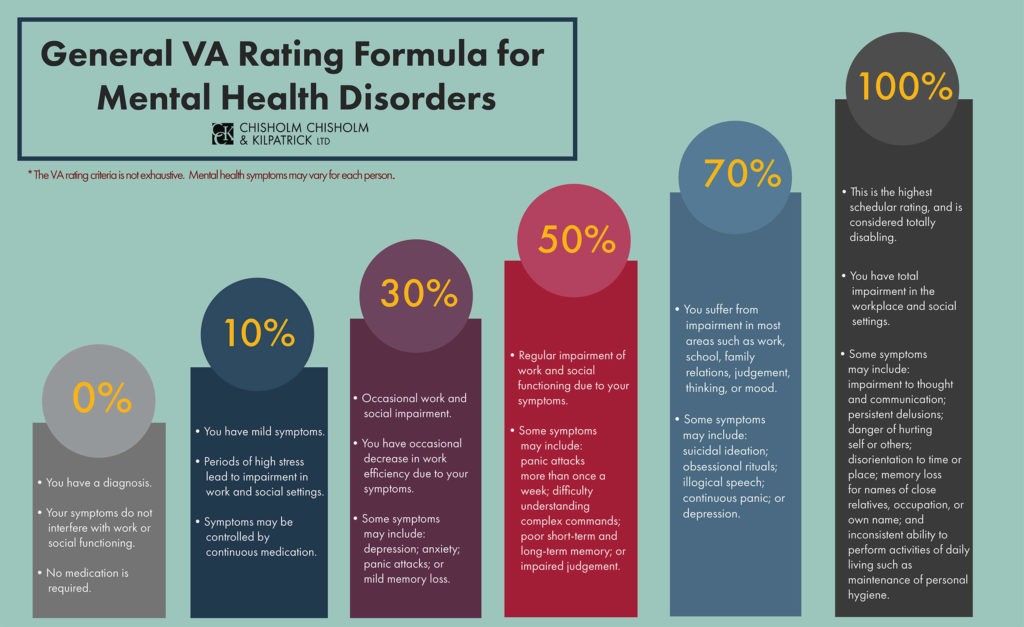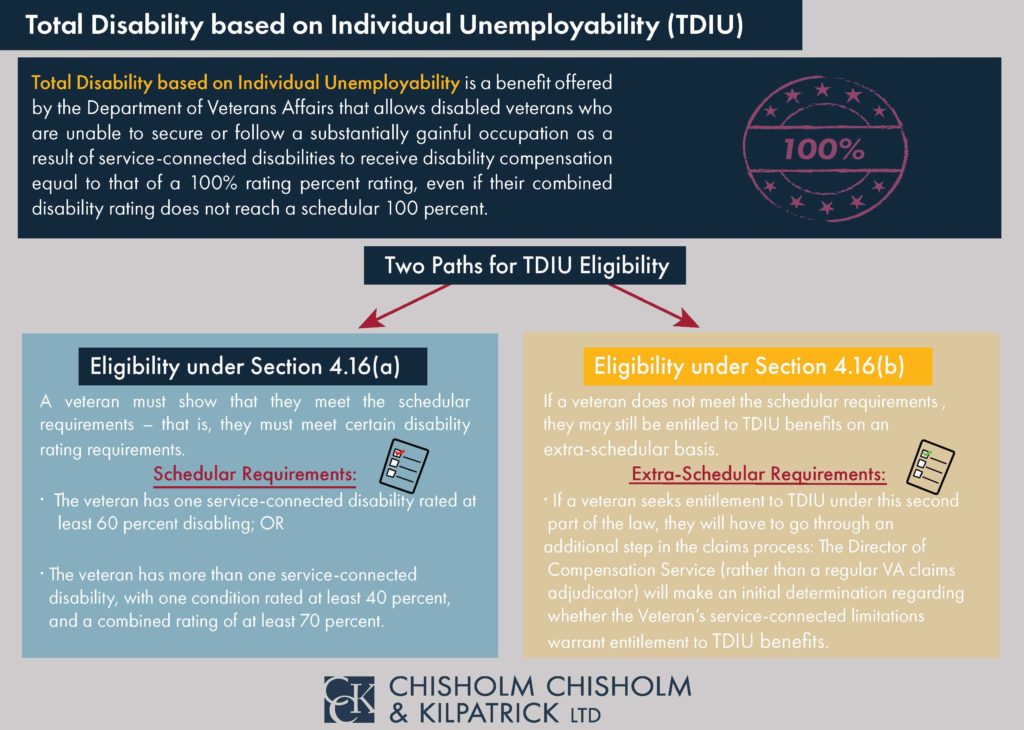IBS Secondary to PTSD VA Disability Ratings

CCK Law: Our Vital Role in Veterans Law
What is Post-Traumatic Stress Disorder (PTSD)?
Post-Traumatic Stress Disorder (PTSD) is a mental health condition that can be caused by experiencing or witnessing a distressing, shocking, or traumatic event. Because of the nature of military service, many veterans eventually develop PTSD as a result of their service.
PTSD can usually be diagnosed by a medical professional, such as a therapist, psychiatrist, or general practitioner.
Symptoms of PTSD
- Intrusive Thoughts or Memories
- Flashbacks
- Avoidance of Certain Situations, People, or Places
- Overwhelmingly Negative Thoughts or Feelings
- Irritability or Angry Outbursts
- Anxiety
- Depression
- Loss of interest in activities or feelings of numbness
- Difficulty sleeping
- Intense nightmares
- Trouble concentrating
- Easily startled
There are many symptoms of PTSD and not all veterans will experience the same ones. Types of symptoms, and severity, can manifest differently from person to person.

What is Irritable Bowel Syndrome (IBS)?
Irritable Bowel Syndrome (IBS) is a chronic disorder affecting the large intestine. The exact cause of IBS is unknown, but the condition affects many veterans. As of 2020, almost 150,000 veterans are service-connected for irritable bowel syndrome.
Symptoms of IBS
- Stomach cramping
- Pain
- Diarrhea
- Gas
- Constipation
How Does Secondary Service Connection Work?
Secondary service connection is a form of service connection for a condition that results from or is aggravated by an already service-connected condition. In this instance, PTSD would be the condition that is already service-connected and IBS would be secondary service-connected to PTSD. This means that a veteran’s IBS is caused, or aggravated, by their PTSD.
To file a claim for secondary service connection, veterans will follow the same steps they would if filing a claim for primary service connection. Veterans may submit a claim for secondary service connection using VA Form 21-526EZ.
In order to file a claim for secondary service connection, veterans will typically need to submit:
- A diagnosis for the secondary condition; and
- Medical evidence indicating the link between service-connected PTSD and secondary IBS.
What Causes PTSD in Veterans?
As mentioned above, PTSD is caused by trauma, whether witnessing or experiencing a traumatic event. This trauma is commonly referred to as a “stressor.” Veterans may have more than one stressor which impacts their PTSD.
Examples of PTSD Stressors for Veterans
- Experiencing an IED explosion
- Witnessing a fellow servicemember be injured or killed
- Witnessing the death or injury of a civilian
- Being part of a burial crew
- Experiencing injury due to combat
- Being assaulted
- Being threatened with assault
- Military sexual trauma
- Threats of military sexual trauma

How is IBS Secondary to PTSD?
Studies have found that having PTSD is a “significant risk factor for IBS.” The link between PTSD and IBS could be based upon the “gut-brain axis,” or the signaling between the gut and the brain.
Because PTSD can create the symptoms of hyperarousal and hypervigilance, the brain can signal the gut to function in the hyperarousal state, which can cause constipation or diarrhea.
In a study of women veterans who received primary care at a Veteran Affairs Medical Center Women’s Clinic, 38 percent reported IBS symptoms. Women with IBS symptoms “reported higher mean scores of anxiety, depression, and PTSD.” Other studies have indicated that women veterans suffer from significantly higher rates of PTSD, meaning many women veterans likely suffer from IBS as a result.
Another study found that, out of approximately 603,000 Iraq and Afghanistan veterans, nearly 20 percent were affected by a gastrointestinal disorder, such as IBS. The study indicated that veterans with a mental health disorder, such as PTSD, were at least twice as likely to have a gastrointestinal disorder as those without a mental health disorder.

How Does VA Rate PTSD?
PTSD is rated as a mental health condition under 38 CFR § 4.130. Ratings range from 0, 10, 30, 50, 70, and 100% based on:
- The level of social and occupational impairment, and
- The frequency, duration, and severity of the symptoms are listed in the criteria.
Below are the criteria outlined for each rating. However, veterans do not need to experience all symptoms outlined in a particular rating criteria to qualify for that rating.
100% for PTSD–Total occupational and social impairment, due to such symptoms as:
- Gross impairment in thought processes or communication
- Persistent delusions or hallucinations
- Grossly inappropriate behavior;
- Persistent danger of hurting self or others;
- Intermittent inability to perform activities of daily living (including maintenance of minimal personal hygiene);
- Disorientation to time or place;
- Memory loss for names of close relatives, own occupation, or own name.
70% for PTSD–Occupational and social impairment, with deficiencies in most areas, such as work, school, family relations, judgment, thinking, or mood, due to such symptoms as:
- Suicidal ideation;
- Obsessional rituals which interfere with routine activities;
- Speech intermittently illogical, obscure, or irrelevant;
- Near-continuous panic or depression affecting the ability to function independently, appropriately and effectively;
- Impaired impulse control (such as unprovoked irritability with periods of violence);
- Spatial disorientation; neglect of personal appearance and hygiene;
- Difficulty in adapting to stressful circumstances (including work or a work-like setting);
- Inability to establish and maintain effective relationships.
50% for PTSD–Occupational and social impairment with reduced reliability and productivity due to such symptoms as:
- Flattened affect;
- Circumstantial, circumlocutory, or stereotyped speech;
- Panic attacks more than once a week;
- Difficulty in understanding complex commands;
- Impairment of short- and long-term memory (e.g., retention of only highly learned material, forgetting to complete tasks);
- Impaired judgment;
- Impaired abstract thinking;
- Disturbances of motivation and mood;
- Difficulty in establishing and maintaining effective work and social relationships
30% for PTSD–Occupational and social impairment with occasional decrease in work efficiency and intermittent periods of inability to perform occupational tasks (although generally functioning satisfactorily, with routine behavior, self-care, and conversation normal), due to such symptoms as:
- Depressed mood,
- Anxiety,
- Suspiciousness,
- Panic attacks (weekly or less often),
- Chronic sleep impairment,
- Mild memory loss (such as forgetting names, directions, recent events).
10% for PTSD– Occupational and social impairment due to mild or transient symptoms which decrease work efficiency and ability to perform occupational tasks only during periods of significant stress, or symptoms controlled by continuous medication.
0% for PTSD–A mental condition has been formally diagnosed, but symptoms are not severe enough to interfere with occupational and social functioning or require continuous medication.

How Does VA Rate IBS Secondary to PTSD?
Veterans receive the same rating for secondary and directly service-connected conditions. VA rates irritable bowel syndrome under 38 C.F.R. 4.114, Diagnostic Code 7319 for Irritable Bowel Syndrome.
Under Diagnostic Code 7319, a veteran may receive a rating of 10, 20, or 30 percent for IBS. Each rating has specific symptoms that a veteran must exhibit to be awarded each respective percentage. Moreover, Non-compensable ratings, or 0 percent ratings, can still be applied if the rating criteria are not met.
Additionally, other functional digestive disorders, such as dyspepsia, functional bloating and constipation, and diarrhea, are also rated under this code.
TDIU for IBS Secondary to PTSD
TDIU, or total disability based on individual unemployability, is a monthly benefit available to veterans who cannot work or maintain employment because of their service-connected disabilities. This benefit compensates veterans at the 100 percent rating level, even if their combined rating does not equal 100 percent.
VA outlines TDIU regulations under 38 CFR § 4.16, which includes subsections (a) and (b). In order to qualify for TDIU under 38 CFR § 4.16(a), or schedular TDIU, a veteran must have:
- One service-connected condition rated at 60% or higher; or
- Two or more service-connected conditions, one of which is rated at 40% or higher, with a combined rating of 70% or higher.
Importantly, both ratings for IBS and PTSD can contribute to the veteran’s overall combined rating. Secondary service connection functions largely the same as primary service connection, meaning that ratings given for secondary conditions are the same as ratings given for primary service connection. A veteran may be eligible for schedular TDIU if they receive a 60 percent rating for PTSD and a 20 percent rating for secondary IBS. This would place the veteran at a 70 percent overall combined rating, making them eligible for TDIU.
Veterans who do not meet the schedular requirements under 38 CFR § 4.16(a) may still be considered for extraschedular TDIU under § 4.16(b).
Need Help with Your VA Claim for IBS Secondary to PTSD?
Claims for irritable bowel syndrome secondary to PTSD can be complicated, mostly due to the vague nature of the IBS rating criteria and the frequency with which veterans suffering from PTSD do not report their symptoms. If your claim for secondary service connection has been denied, it does not mean your case is unwinnable.
CCK has helped veterans win their cases for IBS disability benefits and our experienced team of veterans’ advocates may be able to help you. Contact our office today for a free case evaluation at 800-544-9144.
About the Author
Share this Post


